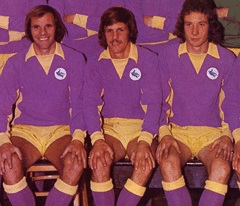Mick McCarthy starts his stint as City manager at his birthplace Barnsley on Wednesday with the team desperate to end their run of six straight defeats, here’s the usual quiz on upcoming opponents with questions dating back to the sixties – I’ll post the answers on Thursday.
60s. With a brother who was best known for a memorable day at Wembley when giants were slain, this forward was described as “a tough, experienced Scot who knew how to handle himself” by one time team mate Kevin Keegan. Barnsley were his first club and, after making his debut as an eighteen year old, he made over a hundred and sixty appearances over the next four years with goals coming at a decent rate. When he moved on, there was something of a false start with white Lancastrians before he headed south to perform in front of the fans at the Cuckoo Lane End for a couple of years. He then settled in the county of the yellow bellies and was a regular first teamer before an injury which Keegan described as “a diabolical challenge…………. the worst thing I had ever seen on a football pitch”. Although he came back, he was eventually forced to retire at the age of thirty and moved into coaching and management. His first chance to be the man in charge came when someone destined to manage his country moved on and so our man took over at a club not too far away from where he had finished his playing days. He didn’t have to move too far for his next job either as he almost took unfashionable seasiders into the top flight. A team not far from Barnsley was his next destination before he returned to his first club on the management front where he set an unwanted record – his career in the game ended with Pilgrims. Who is described here?
70s. A local boy who made close to two hundred appearances for Barnsley, his first club, this defender was signed by a team whose fans sing about an event that was ended in 1918, revived in 1981 and still takes place on 9 June every year. The move was a success, although the two biggest games he was involved in during his five year stay were both lost. In 1976 he moved south to a team trying to restore fairly recent glories, but never settled and moved on for a season to a club whose fans sing about perseverance, then he went a long way to play for a “wooden” club that wasn’t Nottingham Forest. His final team, where he spent three years were quite close to home and have hit hard times recently. They were originally formed by an amalgamation of two teams called Unitarians and Wesleyans, a club that did have an FA Cup record all of their own for more than a century, but now it’s shared with another team. Name the player.
80s. This defender did experience a win against City while playing for Barnsley during this decade, but his team did not even score in two games when he appeared against us in the league. His record against us in the 80s for his second club was much better with the best City could manage being a single draw in three meetings. Who am I describing?
90s. Real Friend in North East becomes Barnsley icon?(4,8)
00s. Starting and finishing his career in Paul Weller territory, this midfielder’s first move enabled him to share Tales from the Riverbank I suppose while moving on loan to seaside locations of completely different character. His next loan took him to Barnsley, who he then signed for permanently. He won his only game for Barnsley against us during this decade and, after nearly a hundred games, he left them. There were plenty of other moves to follow – for example to a team where you may have expected him to remain seated, red songbirds and with Alison Moyet’s favourite team. Internationally, he only won seven caps for a country who could hardly be called a power in the game, but I’m told is a great place to spend a holiday. He did score for them in a Cup Final though and then in a winning penalty shoot out in the same match. Do you know who he is?
10s. Caledonian sage turns up on the rock? (5,7)
20s. He played for Barnsley against us in November and among the other teams he’s played for are Royston Town, Hemel Hempstead Town, Heybridge Swifts, Dulwich Hamlet, Soham Town Rangers and Margate, who is he?
Answers
60s. George Kerr, brother of Sunderland 1973 FA Cup winning captain Bobby, joined Barnsley as a seventeen year old. In 1965, he was transferred to Bury and then quickly moved on to Oxford United. Virtually all of the rest of Kerr’s career was based in Lincolnshire, he was a player for Scunthorpe, took over from Graham Taylor at Lincoln, almost took Grimsby into Division One, had two years at Rotherham and then returned to Lincoln where he had the dubious distinction of becoming the first manager to be automatically relegated from the Football League into the Conference in 1987 – his career ended with a long spell in charge of Boston United.
70s. Pat Howard moved to Newcastle (Blaydon Races) from Barnsley. Howard was in Newcastle teams beaten 3-0 by Liverpool in the 1974 FA Cup Final and 2-1 by Man City in the 1976 league Cup Final before moving on later that year to Arsenal. He didn’t stay long and signed next for Birmingham (Keep right on to the end of the road) before moving to America to play for Portland Timbers. His final club was Bury who share the record for the record for the biggest ever FA Cup Final win with Man City.
80s. Mick McCarthy first played against for Barnsley in a League Cup tie in 1980 at Oakwell which the home side won 3-2. City won 1-0 at that ground when the teams next met in the Second Division a year later, while the reverse fixture ended goalless. When McCarthy moved on to Man City, he was in their team which beat us 2-1 at Maine road in March 1984 and when we were beaten 3-0 at NinIan Park six months later – the reverse game in March 85 finished 2-2.
90s. Neil Redfearn
00s. Kevin Besty began and ended his playing career with Woking and signed for Fulham in 1998. He stayed at Craven Cottage for four years, but was never a regular and was loaned out to Bournemouth, Hull and then Barnsley. Betsy was in the Barnsley team which beat us 3-2 at Oakwell in November 2002 and then played for, among others, Wycombe, Bristol City and Southend. Internationally, he scored for the Seychelles in the Final of the 2011 Indian Ocean Island games in which they beat Mauritius in a penalty shoot out.
10s. Gibralter international Scott Wiseman.
20s. Victor Adeboyejo.




